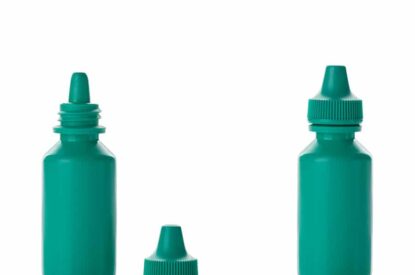Glaucoma Medication
Open-Angle Glaucoma is often treated with medications that either help the eye’s fluid drain better or decrease the amount of fluid being made. Glaucoma medications most commonly are in the form of eye drops. Medications must be taken daily to keep eye pressure at a safe level. In most cases, medications can safely control eye pressure for many years.
It is normal for your medication prescriptions to change over time. Changing medications does not necessarily mean that your glaucoma is getting worse. As your body begins to develop a tolerance for a medication, it may slowly lose its effectiveness and may need to be replaced by a stronger version of the same drug or a different medication. Doctors often can return to previously used medications after your body has had a chance to “forget” the old medication.
Most medications have some side effects, including effects on vision, eye comfort, and sometimes other parts of your body. In particular, older people with glaucoma should look for changes in behavior or mobility that may be a side effect of medications. If the side effects are very uncomfortable or last a while, your doctor may be able to prescribe a different medication.
To make sure your glaucoma medications are not interacting with other medications you are taking, make sure to tell all of your doctors, including your family physician, about your glaucoma medications and any other drugs you may be taking, including aspirin, vitamins and natural remedies. Tell your doctors about any side effects you may be experiencing or allergies you have.
The following are some of the possible side effects of the main classes of glaucoma medications:
- Prostaglandin Analogs: Eye color change, darkening of eyelid skin, eyelash growth, droopy eyelids, sunken eyes, stinging, eye redness, and itching
- Beta Blockers: Low blood pressure, slowed pulse rate, fatigue, shortness of breath
- Alpha Agonists: Burning or stinging, fatigue, headache, drowsiness, dry mouth and nose, allergic reaction
- Carbonic Anhydrase Inhibitors: In eye drop form—stinging, burning, eye discomfort; in pill form—tingling hands and feet, fatigue, stomach upset, memory problems, frequent urination
- Rho Kinase Inhibitors: Eye redness, deposits on cornea, stinging, small bleeds on the white of the eye.
New Treatments on the Horizon
New forms of glaucoma drug delivery are being developed to improve medication treatment options. One area of interest is “sustained-release” medication. Sustained-release medication evenly releases a drug over a longer time. In this way, medications can be used weekly, monthly, or at even longer intervals. This would make the process of taking medications more convenient and efficient and potentially reduce side effects. There are many sustained-release options being researched and developed.
Currently, two sustained-release drug implants are FDA-approved for the treatment of patients with open-angle glaucoma: a bimatoprost intracameral implant and a travoprost intracameral implant. Both implants are approved for one-time use per eye. The bimatoprost implant treatment effects last for about 1 year, and the travoprost implant is effective for about 3 years.
In addition, new classes of drugs to treat glaucoma are being studied. Researchers are working to find glaucoma medications with fewer side effects, ones that can be taken less often, and drugs that are more responsive to the eye and so more effective at lowering eye pressure.
Guide to Glaucoma Medications
A number of medications are currently in use to treat glaucoma. Your doctor may prescribe a combination of medications or change your prescription over time to reduce side effects or provide a more effective treatment. Typically, medications are intended to reduce elevated intraocular pressure and prevent damage to the optic nerve.
Eye drops used in managing glaucoma decrease eye pressure by helping the eye’s fluid to drain better and/or decreasing the amount of fluid made by the eye. Drugs to treat glaucoma are classified by their active ingredient. These include: prostaglandin analogs, beta blockers, alpha agonists, carbonic anhydrase inhibitors, and rho kinase inhibitors. Combination drugs are available for patients who require more than one type of medication.
Alpha Agonists
| Drug Name | Brand Name | Manufacturer |
| Apraclonidine 0.5%, 1% | Iopidine® | Harrow Health, Inc. |
| Brimonidine tartrate 0.1%, 0.15%, 0.2% | Alphagan® P | AbbVie Inc. |
Actions: Decreases the production of intraocular fluid. Also increases drainage of intraocular fluid.
Notes: Side effects can include burning or stinging upon instillation of the eye drop, fatigue, headache, drowsiness, dry mouth, and dry nose.
Beta Blockers
| Drug Name | Brand Name | Manufacturer |
| Betaxolol HCI 0.25%, 0.5% | — | |
| Levobunolol HCI 0.5% | Betagan® | AbbVie Inc. |
| Metipranolol 0.3% | — | |
| Timolol 0.25%, 0.5% | Betimol®, Istalol®, Timoptic in Ocudose (PF), Timoptic XE | Bausch & Lomb, Inc., Théa Pharma Inc. |
Actions: Decreases production of intraocular fluid.
Notes: Side effects can include low blood pressure, reduced pulse rate, and fatigue. Beta blockers can also cause a shortness of breath in people who have a history of asthma or other respiratory disorders. Additionally, beta blockers can change cardiac activity by decreasing the amount of blood the heart pumps out, which may reduce the pulse rate and/or slow down the heart’s response rate during exercise. Rare side effects include reduced libido and depression. “PF” indicates preservative-free medication.
Carbonic Anhydrase Inhibitors (CAI)
| Drug Name | Brand Name | Manufacturer |
| Acetazolamide (oral) 125 mg, 250 mg, 500 mg | — | |
| Brinzolamide 1% | Azopt® | Alcon |
| Dorzolamide 2% | — | |
| Methazolamide (oral) 25 mg, 50 mg | — |
Actions: Decreases production of intraocular fluid.
Notes: Side effects of Acetazolamide and Methazolamide can include tingling or loss of strength of the hands and feet, upset stomach, memory problems, depression, kidney stones, and frequent urination. Side effects of Brinzolamide and Dorzolamide include stinging, burning, and other eye discomfort. Acetazolamide and Methazolamide are oral medications.
Cholinergic (Miotic)
| Drug Name | Brand Name | Manufacturer |
| Carbachol 0.75%, 1.5%, 3% | — | |
| Pilocarpine HCI solution 0.5%-6% | Isopto Carpine |
Actions: Increases drainage of intraocular fluid.
Notes: Many people who use these medications complain of dim vision, especially at night or in a darkened area such as movie theaters. This is due to constriction of the pupil. Miotics increase drainage of intraocular fluid by making the pupil size smaller and thereby increasing the flow of intraocular fluid from the eye.
Prostaglandin Analogs
| Drug Name | Brand Name | Manufacturer |
| Bimatoprost 0.01%, 0.03% | Lumigan® | AbbVie Inc. (0.03% dose available as generic) |
| Latanoprost 0.005% | Xalatan®, IYUZEH® | Pfizer, Théa Pharma Inc. |
| Latanoprostene bunod 0.024% | Vyzulta® | Bausch & Lomb, Inc. |
| Tafluprost 0.0015% (PF) | Zioptan® | Théa Pharma Inc. |
| Travoprost 0.004% | Travatan® Z | Novartis |
Actions: Increases drainage of intraocular fluid.
Notes: Side effects can include eye color change, darkening of eyelid skin, eyelash growth, droopy eyelids, sunken eyes, stinging, eye redness, and itching. “PF” indicates preservative-free medication.
Prostaglandin Analog Drug-Device Combinations
| Drug Name | Brand Name | Manufacturer |
| Bimatoprost 10 mcg implant | Durysta® | AbbVie Inc. |
| Travoprost 75 mcg implant | iDose® TR | Glaukos |
Actions: Increases drainage of intraocular fluid.
Notes: Side effects can include eye color change, darkening of eyelid skin, stinging, eye redness, pain and itching, headache, foreign body sensation (feeling like something is in the eye), dry eye, blurred vision, and sensitivity to light.
Rho Kinase Inhibitors
| Drug Name | Brand Name | Manufacturer |
| Netarsudil 0.02% | Rhopressa® | Alcon |
Actions: Increases drainage of intraocular fluid.
Notes: Side effects can include eye redness, corneal deposits, stinging, and small bleeds on the white of the eye.
Combined Medications
| Drug Name | Brand Name | Manufacturer |
| Brimonidine tartrate & Timolol Maleate 0.2%/0.5% | Combigan® | AbbVie Inc. |
| Brinzolamide & Brimonidine tartrate 1%/0.2% | Simbrinza® | Alcon |
| Dorzolamide HCI & Timolol Maleate | Cosopt® (PF available) | Théa Pharma Inc. |
| Netarsudil and Latanoprost 0.02%/0.005% | Rocklatan® | Alcon |
Actions: Increases drainage of intraocular fluid.
Notes: Rocklatan® is a combination of a rho kinase inhibitor and a prostaglandin analog—side effects include eye redness and stinging. Combigan® is a combination of beta blocker and alpha agonist–side effects include symptoms of both. Cosopt® is a combination of beta blocker and carbonic anhydrase inhibitor—side effects include burning and/or stinging of the eyes and changes in sense of taste. “PF” indicates preservative-free medication.
Learn More


